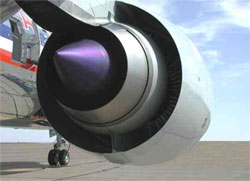 |
 |
 |
 Editorials | Environmental | September 2005 Editorials | Environmental | September 2005  
Scientists: Cut Air Travel for Environment
 Michael McDonough - Associated Press Michael McDonough - Associated Press


| | British environmental scientists urge big cut in air travel to reduce greenhouse gas emissions. |
Britain should drastically reduce the growth of air travel to bring greenhouse gas emissions within levels that will avoid dangerous climate change, a report by leading environmental scientists said this week.

Air travel has boomed in recent years thanks largely to cheaper flights, and the government predicts that the number of air passengers in Britain will more than double by 2020. But aviation is a major source of carbon dioxide, the main greenhouse gas, because planes burn huge amounts of fossil fuels at high altitudes.

The government says it wants a 60 percent cut in carbon dioxide emissions by 2050, compared to 1990 levels, as the nation's contribution toward preventing an increase in temperatures that would threaten a dangerous level of climate change.

But the Tyndall Center for Climate Change Research, which includes scientists from universities across Britain, said that target is incompatible with the current expansion rate of the aviation industry.

"If the U.K. government does not curb aviation growth, all other sectors of the economy will eventually be forced to become carbon neutral," said Kevin Anderson, who led the research team. "It will undermine the competitiveness of U.K. industry."

Economic activity is said to be carbon neutral if its net carbon dioxide emission level is zero a requirement that would severely restrict most industries and hamper economic growth.

But the Tyndall Center report, "Decarbonizing the United Kingdom," said combining economic growth with emissions reductions remains possible, if improvements in energy efficiency are made and more low-carbon sources of energy are used.

Aviation, however, is much more difficult to decarbonize, so growth in the sector must be "dramatically curtailed," the report said.

Current government predictions suggest the number of air passengers will grow from 189 million in 2002 to between 350 and 460 million in 2020.

Environment Minister Elliot Morley said he accepted the need to reduce emissions, but opposed a tax on aviation fuel.

"The evidence is that people will simply pay the tax and continue to travel and we won't actually stop the growth," Morley told British Broadcasting Corp. TV.

"I actually think there are other ways of doing it. The most effective one is to include aviation within carbon trading schemes, so there is an absolute limit on the amount of emissions from the aviation sector."

Britain is pressing for aviation to be included in the second phase of the EU Emissions Trading Scheme, which begins in 2008, according to the Department for Environment, Food and Rural Affairs.

The emissions trading scheme allows European companies that emit less carbon dioxide than allowed to sell unused allotments to those who overshoot the target.

Environmental pressure group Friends of the Earth, however, said it favored an aviation fuel tax.

"The Department of Transport's own models on aviation growth show dramatic reductions in air travel when assumptions are added for fuel taxes and other factors," the group's director Tony Juniper said in a statement.

"Aviation is a rogue sector and its environmental impact is out of control. Climate change is the most urgent challenge facing humanity and yet aviation policy is doing the opposite of what is needed." | 
 | |
 |



